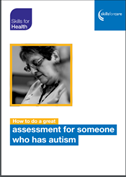AUTISM ASSESSMENT: GETTING IT RIGHT FOR ADULTS WITH AUTISM
When carrying out an autism assessment for an individual who is looking for support in their day-to-day living, it is vital to obtain the pertinent information to ensure the support provided will enhance that person’s life.
The assessment must take into account the person’s wishes and aspirations as well as their needs in terms of autism and independence skills.
It is a requirement of the Care Act 2014 that any adult who believes they need support can request one from their local authority. If they have autism this is regardless of where they are on the spectrum, their IQ or their financial situation. There is also a requirement that councils carry out a ‘transition assessment’ if it is believed that the individual will need support once they turn 18 even if they had not received support from children’s services.
When carrying out an assessment, the approach of the assessor is as important as the content of the assessment.
Approach
Skills for Care and Skills for Health published a guide in 2015 called ‘How to do a great assessment for someone who has autism’.
 This guide highlights the importance of preparation prior to the assessment. Thought should be given to the timing of the assessment as well as to the environment where the assessment should take place. This includes paying attention to any sensory issues which might arise.
This guide highlights the importance of preparation prior to the assessment. Thought should be given to the timing of the assessment as well as to the environment where the assessment should take place. This includes paying attention to any sensory issues which might arise.
The guide also stresses the importance of finding out what the individual’s preferred method of communication is and adapting the assessment to it. Always explain clearly what will happen and give the individual processing time.
A list of the knowledge, attitudes and skills the assessor needs are also given in the guide.
The National Autistic Society also has a helpful guide called ‘Assessments and Care Plans for Adults in England’. This guide also highlights the importance of preparation for the assessment as well as pitfalls to watch out for when assessing. It also includes areas which can be included in the assessment.
Both the above guides are essential reading prior to undertaking an autism assessment for adults.
Content
A comprehensive assessment should take into account 4 main areas –
1. Wishes and aspirations
2. Impact of autism on the individual, including social communication, rigidity and routines, sensory differences and possible causes of anxiety.
3. Wellbeing including health
4. Independence skills
It is essential to remember that each individual will experience the world differently in each of the above areas.
A thorough assessment will provide a guide of questions for each assessment area and will also provide an opportunity for free notes to capture the individual’s experiences.
An assessment should also take into account that an individual’s needs can vary throughout the day and night and the type of support they need and the level of support they need can also vary.
Consideration must also be given to the difference between a person’s abilities and their willingness. As an example, a person might be quite capable of cooking themselves a meal; however, their impairment in executive functioning might mean that they are either not motivated to do so or they cannot plan the meal.
Similar consideration should be given to the literal nature of a person’s comprehension and how a question is asked, eg ‘Can you cook?’. They might answer ‘Yes’ because they have learnt to make toast. However, they might not be able to ‘cook’ anything else.
A comprehensive assessment tool
Living Autism has developed autism assessment tool that helps the assessor to ask all the pertinent questions to produce a comprehensive assessment of wishes and support needs. A full report is automatically produced and this can be used to establish type and level of support as well as the basis for a care plan.
For more information please email info@livingautism.co.uk
_______________________________
If you need help looking for services for an individual with an autism spectrum condition, we will do our best to help. Click below for the Autism Placement Support Service.



